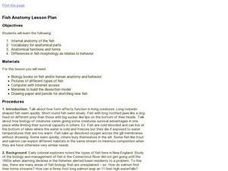Curated OER
Sea Horse Body Parts
Students complete a diagram of sea horse body parts. In this sea horse lesson, students review the story Sea Horses A True Book, complete a sea horse diagram using Internet sights to help, make new entries in their KWL charts and...
Chicago Botanic Garden
Preparing for Project BudBurst
Male deer growing antlers to begin the breeding season is an example of a phenological event. First in a four-part series is an activity requiring individuals to collect phenological data on their campus. Classes discuss phenology, the...
Curated OER
How Are Plants Similar And Different?
Studetns create an index card database of different categories of plants such as bushes, trees, flowers, grasses and vegetables. They review the different parts of a plant and label pictures of plants on the database cards. They use the...
Curated OER
Prehistoric Pen Pals
Students read online information and identify relevant information about a particular dinosaur species, assume the personality of a specific dinosaur species, and write online "getting to know you" letters to other student-dinosaurs in...
Curated OER
To Eat or Not to Eat?
Learners identify various parts of plants and determine which parts people eat. They conduct a celery stalk experiment in which they determine the value and use of the stem, and how it helps the plant to meet its needs. Students use a...
Curated OER
Greenhouse Effect: A Computer Simulation
Students complete an online simulation of the greenhouse effect. In this lesson on the greenhouse effect, students use a website, similar to a webquest, to simulate and answer questions on how the greenhouse effect works. This lesson is...
Teach Engineering
Keepers of the Gate Journal and Brainstorm
The second segment of a seven-part series reviews the challenge of determining whether gargling with salt water helps a sore throat. Individuals journal what they know about the challenge and what they are trying to figure out to...
Acoustical Society of America
Anatomy of a Wave
Pair physical science learners up, and have one describe a transverse wave while the other blindly attempts to draw it. Then reveal an actual diagram and explain the different parts of the wave: crest, trough, wavelength. Though most of...
Curated OER
Exploring Plants
Students examine plants using adiotapes, Internet research, and print media. They name the plant parts and discover their functions. Students create computer-generated pictures of their plants and label the parts. Other activities...
Curated OER
Examining a Microchip
In this computer technology lesson learners investigate silicon microchips. Students explore microchip technology using a microscope. Lesson contains hands on investigations.
Curated OER
Plant Parts
Students use "Kid Pix" to explore plants. For this science and technology lesson plan, students become familiar with plant parts and label them on a plant. Students tell the functions of each of the plant parts.
Curated OER
Basic Ideas of Inheritance
Students enter personal information into a database. The information is used to reinforce the ideas of inheritance that is found in 1st Grade Science. Access to technology is essential for this lesson. Adding the use of a mirror for...
California Academy of Science
Building Better Buses: Transportation Design Challenges
Scholars learn about a series of three challenges when they design a bus system for a small town. They determine the bus routes and then figure out the best type of fuel to use before considering the cost of going electric. Learners...
Curated OER
Microscope Mania
Students examine parts of a microscope and how to use a microscope at five lab stations. They identify parts of a microscope by describing the differences between low power and high power. They visit Internet sites (included in the...
Curated OER
Growth and Changes in Plants
Students investigate the growth and changes in plants. They view a video and discuss the changes in plants. They work in small groups to demonstrate vocabulary words to the class. They visit a green house and take pictures of plants to...
Science 4 Inquiry
Eukaryotic Cells: The Factories of Life
Eukaryotes include humans, animals, and plants. Scholars learn about the parts of eukaryotic cells. They design models of a store and match the correct function of each part to the function of a part of the cell. They review their...
Teach Engineering
Come On Over Rover
Introduce your class to the steps that occur in the manufacturing of parts, the assembly, and the testing of a Mars rover. Pupils learn about fabrication techniques and tolerances in the manufacturing process.
Art Institute of Chicago
Color Combinations
Explore color through an examination of pointillism and light. Class members view Georges Seraut's famous painting on a computer, zooming in and out to see the details and effects of the technique. They then cover how light and color are...
Berkeley Lab
Virtual Frog Dissection Kit
Fluffy is one of the most common names for a pet frog. Fluffy, the digitized frog in this dissection kit, opens up quite literally to allow scholars to see what's inside. The basic kit encourages pupils to click on various organs to see...
NOAA
How Do We Know?: Make Additional Weather Sensors; Set Up a Home Weather Station
Viewers learn about three different weather measurement tools in installment five of the 10-part Discover Your Changing World series. They build weather vanes to collect data on wind speed, barometers to determine air pressure, and...
US Environmental Protection Agency
Types of Radiation
Learn about radiation, and what everyday items produce radiation, with a series of activities about heat transfer. Kids go over basic information about electromagnetic waves and ionizing radiation before performing several experiments...
Teach Engineering
Microfluidic Devices and Flow Rate
When you have to flow, you have to flow. The lesson plan introduces class members to microfluidic devices and their uses in medicine. They watch a short video on how the diameter affects the rate of flow. The worksheet has individuals...
Curated OER
What We Need
First graders identify basic needs of plants. In this plant growth lesson, 1st graders observe types of plants and review the parts of a plant as well as the development of a seed. Students review related vocabulary and read The...
Curated OER
Fish Anatomy
Students identify and interpret the internal anatomy of the fish. They also identify and define vocabulary for anatomical parts and anatomical functions and forms. Finally, students identify and interpret the differences in fish...























